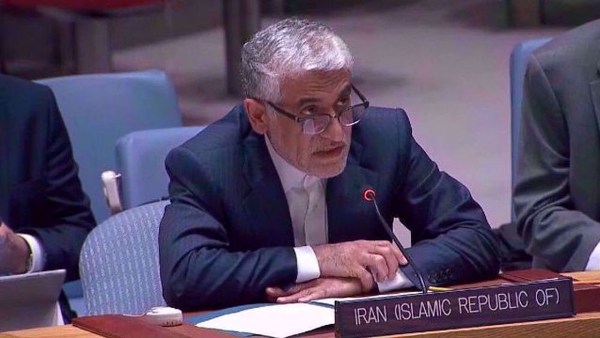
The spokesman for Iranís Foreign Ministry, Saeed Khatibzadeh
Iranís Foreign Ministry says reaching an agreement between Tehran and the P4+1 group of countries over the 2015 deal at the talks in the Austrian capital of Vienna hinges on the political decisions of the "other side."
Speaking at a weekly press conference on Monday, Saeed Khatibzadeh said, "There is no deadlock in Vienna [talks], the negotiations are being held as before."
"When dialogues reach days in which serious issues must be discussed, they become difficult. Certainly, they are facing some delays."
The spokesman added Tehran, after the return of the Iranian delegation to Iran, once again reviewed and discussed the presented proposal.
"Of course, giving and receiving proposals is normal, and no extraordinary thing has happened."
The pending issues in the Vienna talks are "key issues", he said, adding reaching an agreement in the negotiations "is awaiting political decisions of the other side".
"Tehran has made its political decisions years ago and remained in the JCPOA. We are waiting to receive an answer to Iranís initiatives and proposals."
"The more the will of Americans and the European troika increases, our distance from reaching an agreement will decrease," he said, referring to France, Germany and Britain who are signatories to the 2015 deal.
Former US president Donald Trump unilaterally left the JCPOA in May 2018 and re-imposed the anti-Iran sanctions that the deal had lifted. He also placed additional sanctions on Iran under other pretexts not related to the nuclear case as part of his "maximum pressure" campaign.
Following a year of strategic patience, Iran decided to let go of some of the restrictions on its nuclear energy program, resorting to its legal rights under the JCPOA, which grants a party the right to suspend its contractual commitments in case of a non-performance by the other side.
The US administration of President Joe Biden had voiced a willingness to compensate for Trumpís mistake and rejoin the deal, but it has retained the sanctions as leverage.
Envoys from Iran and the P4+1 group of countries - Britain, France, Russia, and China plus Germany - have been holding negotiations in the Austrian capital for roughly 10 months in a bid to resurrect the JCPOA.
The eighth round of the talks has resumed since Sunday after it was put on pause as diplomats returned to their capitals for consultations.
US made no decision on prisoner swap
Elsewhere in his remarks, Khatibzadeh said Washington has not also made a decision on a prisoner swap with Tehran, and is waiting for the results of the Vienna talks.
He stressed that the issue has always been on Iranís agenda.
"The issue is also going on in parallel with Vienna [talks] and we did not make anything conditional on the Vienna negotiations. It seems that the American side has not made its decision in this area and is waiting for the results of Vienna."
The prisoner swap is "a humanitarian issue" that could be resolved "independently" and serves as "a good ground to show that Washingtonís behavior has changed", the spokesman added.
‘Everything in Vienna talks depends on USí
As the talks are underway in Vienna, Tehran University Professor Mohammad Marandi, who is accompanying the Iranian delegation to the Vienna talks, told Sputnik on Monday that it is too early to say whether a deal is around the corner or not.
"There is a significant possibility that there will be an agreement...as we see some movement from the US and Europe. But there is also a chance there wonít. Everything will depend on Washington and on whether they really want it".
He also stressed Tehranís right to demand the removal of the US sanctions in a verifiable process.
"In 2015, we made sure to implement the deal. It was [President Barack] Obama, who didnít. Behind closed doors, he told the Treasury and various firms not to work with us. In 2018, they violated the agreement again by leaving it, while we were loyal. So, what Iran is saying now is that you canít cheat us again".
LINK: https://www.ansarpress.com/english/26812
TAGS:






























 Iran rejects Reuters report on deal in Vienna talks as effort to boost Western sideís standing
Iran rejects Reuters report on deal in Vienna talks as effort to boost Western sideís standing 




